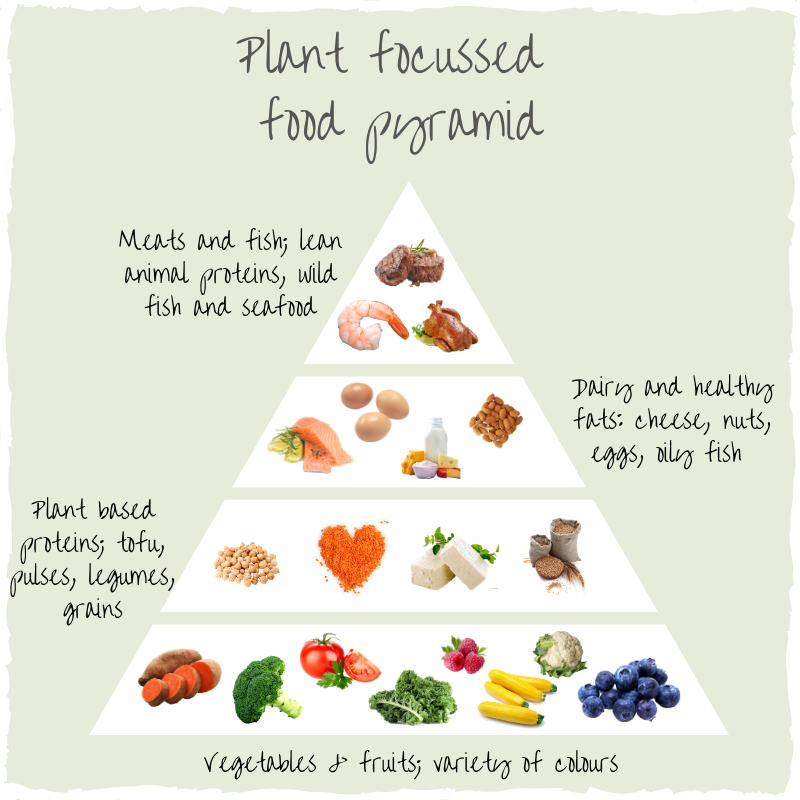A Plant Focussed Food Pyramid - how to build a healthy and sustainable diet for Life
It should be no surprise if I say that when you eat more plants, you are not just benefiting your health but also the health of our planet. However, health should not be extremist or exclusive - quite the opposite in fact.
What if we were to flip the conventional on its head - switch up how we do things. Instead of putting meat centre stage, we headline with plants, allowing meat to be the supporting act if you will.
A plant focussed diet, that doesn’t exclude animal produce.
It is somewhat obvious that when eating more plant focussed, vegetables and fruits with make up the bulk of your daily diet. A rough goal should be 5 - 9 servings of vegetables a day with 2 - 3 servings of fruits. From a nutritional perspective fruit and veg are the staples that provide us with vital vitamins, minerals and fibre.
In the food pyramid I have made plant proteins the second most important component. Protein is a vital macronutrient to our health in order to build and repair tissues, make enzymes and produce hormones. It is a vital building block of bones, muscles, cartilage, skin, and blood. Providing you are plant protein savvy, you can get all the protein the body needs from plant sources, but it does take some effort. Along with beans and legumes, grains play a vital role in food combining (the process of matching foods together to create a complete protein that contains all 9 essential amino acids). Good sources of grains include quinoa, rice and buckwheat with legumes such as chickpeas and lentils being both inexpensive and versatile.
A 2017 anaylsis found that eating a diet rich in plant proteins lead to a decrease in risks of heart disease, strokes and diabetes; health benefits worth eating more beans for don't you agree?!
I have also included Tofu/Soya in this section. Tofu has had a bad rap of late, with some numb-nuts shouting about its hormone disrupting capabilities. Sure you don't have to include tofu in your diet but it is an easy, affordable complete plant protein that takes little preparation.
Addressing the various negative beliefs around the evils of soya; I can tell you that there is no scientific evidence that suggests it can effect testosterone levels. What is does contain is high concentrations of isoflavones, a type of plant estrogen, which are plant hormones (remember we are not plants), that are also found in coffee beans, oats, and lentils - to name but a few!! In the same breath there is confusion as to whether Soya is a cancer risk due to some cancers growing in the presence of excess estrogen. However observation studies of women who consume soy over a long period of time, shows either a protective or neutral effect.
Thirdly, we come to dairy, healthy fats and eggs. We need fats for energy and to support cell growth and hormone production as well as helping the body to absorb nutrients (namely vitamins A, D and E). We know that eating too much saturated fat is bad for us, so our focus should be on consuming good quality Mono and Poly unsaturated fat sources, which include nuts, olive oil, avocados, oily fish like salmon and mackerel, as well as seeds like chia and flax. Eggs, we know are a powerhouse of nutrition, and can provide a good amount of protein in a predominately plant focussed diet. Dairy is always a topic of discussion but if you tolerate it and ultimately enjoy it, there is no need for it to be excluded from your diet. Read labels with care to ensure products like yogurts and milks don’t have added sugars; the less added to a product the better.
Lastly; meat. It is no surprise (I hope) when detailing a plant focussed diet that meat lies at the top of the pyramid, securing the smallest space. Meat does have nutritional benefits, with it being rich in protein, iron and B12. By pushing meat to the side of the plate, away from the centre; we can be more mindful of choosing better quality meat which is often more expensive. Where possible buying organic, local, grass fed meats and wild fish not only benefits us but the planet too.
The greatest thing about eating a plant focussed diet is its flexibility and lack of exclusion. One day you might choose not not eat any meat at all and another you have the choice to include it. With an increase in plants, potentially it means a decrease in processed items overall, another win for prioritising more fruits and vegetables. You don't have to be all or nothing to be making healthy and sustainable choices, incorporating a few more veggies and decreasing your meat portions in size is a great place to start.



